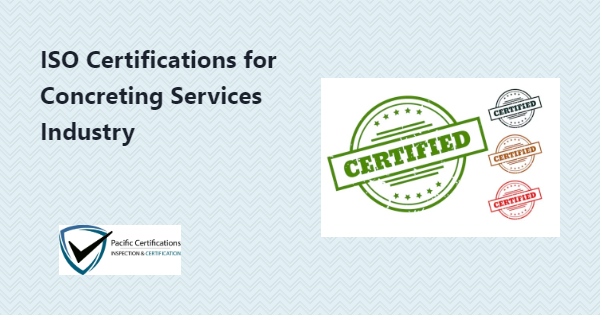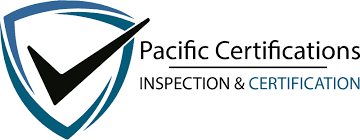ISO Certifications for Concreting Services, Requirements and Benefits

Introduction
The concreting services industry operates in a quality-critical, safety-sensitive, and specification-driven construction environment where material consistency, workmanship accuracy, curing control, structural integrity, and site safety directly influence the durability, load-bearing capacity, and long-term performance of built assets. Concreting service providers are involved in activities such as formwork, reinforcement placement, concrete batching and pouring, finishing, curing, joint treatment, testing, repairs, and rehabilitation works across residential, commercial, industrial, and infrastructure projects.
With stricter structural codes, higher expectations for strength and durability, increased scrutiny from consultants and engineers, and tighter project timelines, concreting contractors are under constant pressure to demonstrate disciplined operational control. Poor quality concrete, improper curing, safety incidents, or weak documentation can lead to structural defects, rework, delays, legal exposure, and reputational damage. ISO certifications provide an internationally recognized framework to standardize concreting operations, manage risks, ensure safety and environmental responsibility, and strengthen credibility with clients, regulators, and project stakeholders.
In concreting services, trust is built on strength, consistency, and control.
Quick Summary
ISO certifications provide concreting service providers with internationally recognized frameworks to manage workmanship and process quality through ISO 9001, ensure occupational health and safety through ISO 45001, manage environmental responsibilities through ISO 14001, protect mix designs, drawings, and test records through ISO/IEC 27001, ensure continuity of critical concreting operations through ISO 22301, and strengthen project and business risk governance through ISO 31000. These standards support compliant concrete works, safer sites, and reliable structural outcomes.
For guidance on selecting the most relevant ISO standards for your concreting services business, contact [email protected].
Applicable ISO Standards for Concreting Services
Below are the key ISO standards applicable for Concreting Services
ISO 9001:2015 (Quality Management System)
ISO 9001 helps concreting contractors standardize mix approval, batching control, formwork preparation, reinforcement placement, pouring methods, finishing, curing, inspection, testing, defect rectification, and handover processes. It improves consistency across pours, reduces defects, and ensures concrete works meet design strength, durability, and specification requirements.
ISO 14001:2015 (Environmental Management System)
ISO 14001 supports responsible management of environmental aspects such as concrete waste, washout water, dust, noise, cement handling, and runoff control. It helps concreting service providers comply with environmental regulations and meet sustainability expectations increasingly required in modern construction projects.
ISO 45001:2018 (Occupational Health and Safety Management System)
Concreting works involve risks such as heavy machinery operation, manual handling, exposure to wet concrete, silica dust, formwork collapse, and working in confined or elevated areas. ISO 45001 provides a structured framework to identify hazards, assess risks, ensure legal compliance, train workers, and prevent accidents and occupational illnesses.
ISO 27001:2022 (Information Security Management System)
Concreting contractors handle sensitive project information including structural drawings, mix designs, test results, inspection reports, and client data. ISO/IEC 27001 ensures that technical and commercial information is protected against unauthorized access, loss, or misuse, especially when digital project systems are used.
ISO 50001:2018 (Energy Management System)
For companies that seek to improve energy efficiency and reduce energy costs, ISO 50001 provides a framework for managing energy usage, which can be particularly relevant for concrete production facilities.
ISO 22301:2019 – Business Continuity Management Systems
Concreting operations are time-sensitive and can be severely affected by equipment failure, supply disruptions, labor shortages, or weather conditions. ISO 22301 ensures that critical concreting activities can continue or recover quickly, minimizing delays and structural risks.
ISO 31000:2018 – Risk Management
ISO 31000 enables concreting service providers to systematically identify and manage risks related to material quality, safety incidents, curing failures, schedule delays, cost overruns, and contractual liabilities. It strengthens governance and supports informed decision-making across multiple projects.
ISO 29001 (Petroleum, petrochemical, and natural gas industries - Sector-specific quality management systems)
For concreting services related to the oil and gas sector, ISO 29001 specifies quality management requirements specific to that industry.
Click here to find more applicable standards to your industry
What are the Requirements of ISO Certifications for Concreting Services Industry?
Concreting service providers seeking ISO certification must establish documented management systems and demonstrate consistent implementation across site operations and governance functions. Key requirements include the following:
ISO 9001:2015 – Quality Management Systems
Document concreting procedures, mix controls, and quality checkpoints
Define quality objectives aligned with strength, durability, and specification compliance
Control drawings, mix designs, inspection records, and test results
Monitor non-conformities, defects, and rework
Manage subcontractor and material supplier performance
Conduct internal audits and management reviews
ISO 45001:2018 – Occupational Health & Safety
Identify hazards related to machinery, formwork, dust, and manual handling
Assess OH&S risks and implement control measures
Ensure compliance with safety legislation and site permit requirements
Provide safety training, PPE, and toolbox talks
Establish incident reporting and emergency response procedures
Monitor safety performance and continual improvement
ISO 14001:2015 – Environmental Management
Identify environmental aspects of concreting activities
Control concrete waste, washout water, dust, and emissions
Manage cement, additives, and hazardous substances
Ensure compliance with environmental regulations
Monitor environmental performance and improvement actions
ISO/IEC 27001:2022 – Information Security
Identify and classify technical and commercial information assets
Conduct information security risk assessments
Implement access controls for drawings and quality records
Secure digital platforms and shared documentation
Manage third-party access to sensitive information
Monitor and improve ISMS effectiveness
ISO 22301:2019 – Business Continuity
Identify critical concreting operations and dependencies
Conduct business impact analysis (BIA)
Develop continuity and recovery plans
Plan for equipment, supply chain, and workforce disruptions
Test and review continuity arrangements
Tip:Map one complete concreting lifecycle—from mix design approval and batching to pouring, finishing, curing, testing, and handover—against ISO requirements to identify quality, safety, and continuity gaps early.
For assistance in evaluating your concreting services against ISO requirements, contact [email protected].
What are the Benefits of ISO Certifications for Concreting Services Industry?
ISO certifications provide concreting service providers with strong operational and commercial advantages, including:
Consistent concrete quality and structural performance
Reduced defects, rework, and structural failures
Safer worksites and improved worker health protection
Better compliance with structural, safety, and environmental regulations
Stronger control over mix designs, tests, and inspection records
Reduced delays and cost overruns
Increased trust from engineers, consultants, and clients
Improved eligibility for commercial, industrial, and infrastructure projects
Better environmental performance and waste management
Long-term business credibility and resilience
Global demand for concreting services continues to grow alongside infrastructure development, urbanization, and industrial expansion. The global ready-mix and concrete construction market is projected to exceed USD 1 trillion in a coming years, driven by highways, bridges, commercial buildings, industrial facilities, and urban housing projects.
At the same time, regulators, engineers, and project owners are placing stronger emphasis on quality assurance, safety performance, and documented management systems. Concreting service providers demonstrating ISO-aligned governance are better positioned to secure high-value projects, manage risks, and deliver durable structures.
Looking ahead, professional concreting contractors operating in regulated construction markets are increasingly expected to meet essential compliance requirements through ISO certifications such as ISO 9001, ISO 45001, and ISO 14001.
How Pacific Certifications Can Help
Pacific Certifications, accredited by ABIS, acts as an independent certification body for concreting service providers by conducting impartial audits against applicable ISO standards. Our role is to objectively assess whether documented management systems and concreting operations conform to international ISO requirements, based strictly on verifiable evidence and records.
We support concreting service providers through:
Independent certification audits conducted in accordance with ISO/IEC 17021
Objective assessment of quality, safety, environmental, and risk controls
Clear audit reporting reflecting conformity status and certification decisions
Internationally recognized ISO certification upon successful compliance
Surveillance and recertification audits to maintain certification validity
For ISO certification for concreting services, contact [email protected]or call +91-8595603096.
Ready to get ISO certified?
Contact Pacific Certifications to begin your certification journey today!
Author: Ashish
Suggested Certifications:
Read more: Pacific Blogs

